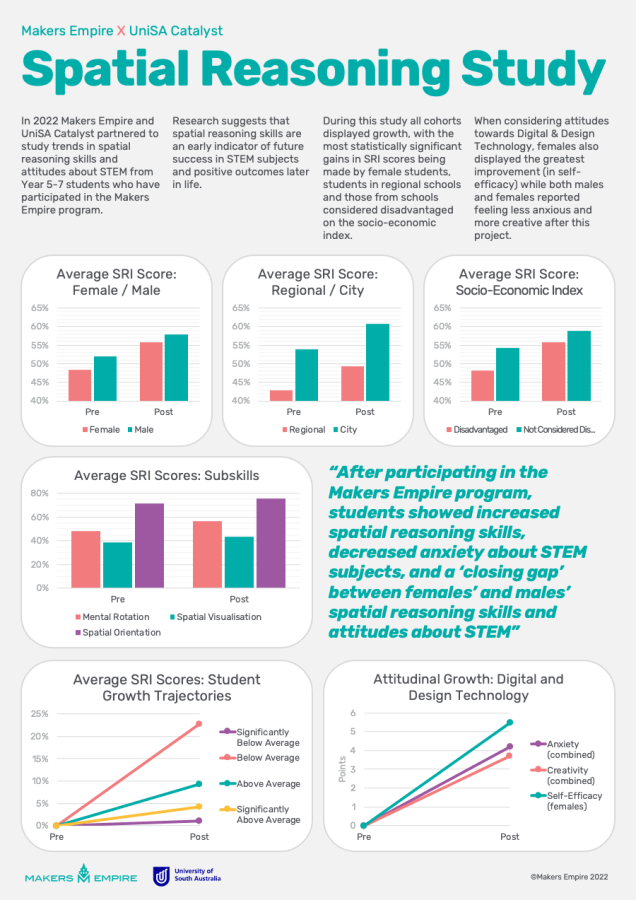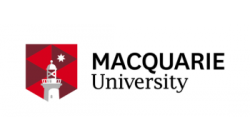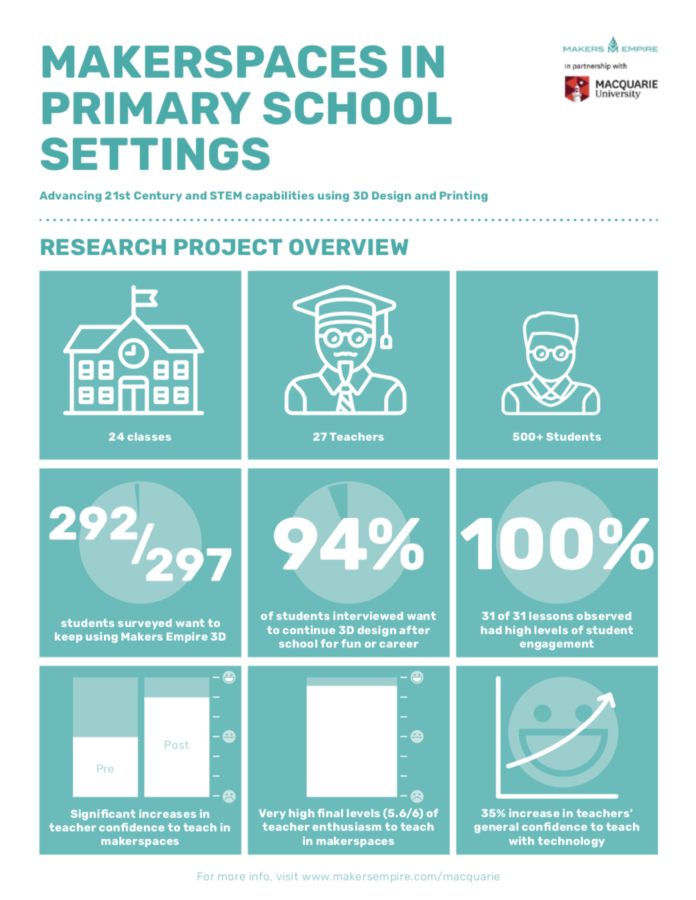Seeking an evidence-backed learning tool? A number of research studies and teacher surveys undertaken in Australia and America show the impact that Makers Empire’s pedagogically sound and differentiated approach is having on influencing learning outcomes for students.
A young person’s spatial reasoning ability has long been an indicator of their future success in Science, Technology, Engineering and Mathematics achievement otherwise known in the greater community as STEM achievement. However, until recently, there has been little formal research done to investigate methods to improve spatial reasoning skills in young people as well as any related changes in students’ attitudes towards STEM that may occur.
A 2022 university research study reveals compelling evidence that using Makers Empire can significantly improve primary school students’ spatial reasoning skills, whilst also improving student’s attitudes and positive feelings towards STEM and Design Thinking.
Spatial reasoning refers to the capacity to think about the relationships between shapes and objects within environments, whether they be virtual or real. Training has been shown to improve student achievement in STEM and has particular influence on mathematical ability.
Traditionally, spatial reasoning within the primary classroom has been developed with manipulatives and static diagrams but virtual 3D environments provide the opportunity to extend thinking through cleaner, more flexible and extensible features.
Three important skills are spatial orientation, mental rotation and spatial visualisation.


Spatial orientation refers to the way people mentally position themselves in the world. It is key to the key mathematical understanding of ratio and proportion, and research indicates it’s an important predictor of mathematical performance. Researchers observed growth in spatial orientation across all schools with an average change across all students of 4.3%.
Mental rotation is often one of the most natural elements of spatial reasoning and consequently has been extensively researched. Geometry clearly benefits from the ability to mentally rotate 3D objects because it ensures different aspects of shapes and objects can be compared. Researchers observed significant growth in mental rotation of 8.7% across all students.
Spatial Visualisation relates to imagining multi-step transformations within an object or shape. Researchers observed significant growth in spatial visualisation of 4.9%. There are identified links between children’s spatial visualisation development and the ability to create patterns, indicating the importance of spatial visualisation in the development of mathematical skills.
Female students showed greater growth in spatial reasoning scores compared to their male peers: females showed an average growth of 9.3% compared to 5.3% for males. As females tended to have lower SRI scores to start with, this suggests that Makers Empire may be working to close the gap.
The School Attitude Study measures students’ attitudes towards their subjects against nine factors including anxiety, difficulty, creativity and relevance. After using Makers Empire, female students showed a significant improvement in self-efficacy towards Digital and Design Technologies.
The School Attitude Study measures students’ attitudes towards their subjects against nine factors. After using Makers Empire, female students rated Digital and Design Technologies more positively than their male peers for personal usefulness, career usefulness and intentions to continue with study.
Makerspaces have been widely advocated as a way to develop STEM abilities and soft skills. However, until recently, there has been little research that investigates the learning and teaching outcomes possible with makerspaces, particularly for younger students.
A 2018 Australian university research study on makerspaces in primary school settings reveals the compelling evidence of benefits of using Makers Empire for primary educators.
Across the 24 Kindergarten to Year 2 classes that were analysed, students developed a range of 21st century capabilities including creativity, problem-solving, critical thinking, inquiry, design thinking, collaboration, autonomy, literacy, numeracy, scientific understanding, digital literacy, communication, reflective learning capabilities and resilience.
Maker activities using 3D technology resulted in very high levels of student engagement, as well as increased levels of student confidence (particularly for less capable students). There was very strong student demand to complete further lessons involving 3D design and printing.
Teachers indicated that the well-structured, pedagogically grounded, hands-on and situated professional learning enabled them to develop a better understanding of makerspaces, how to teach in them, the technical skills required, and 21st century capabilities. The professional learning also significantly increased their confidence to teach in makerspaces.
An unanticipated outcome of the study was the extensive teacher transformation that took place. Several teachers indicated that they had shifted to be more collaborative, flexible, and comfortable with technology. Many teachers entered learning partnerships with students, and as a result, students came to see their teachers as models of life-long learning.


Researchers observed high levels of creativity in 71% of lessons
Researchers observed high levels of design thinking in 64% of lessons
Researchers observed high levels of problem-solving in 58% of lessons
100% of lessons observed had high levels of student engagement
98% of students wanted to keep using Makers Empire at school
94% of students wanted to keep using Makers Empire after school for fun or work.
99% of teachers identified positive links between students’ literacy &/or numeracy and using Makers Empire
The number of teachers with a strong to extensive understanding of Design Thinking increased from 42% to 76%
The number of teachers feeling “very confident” in their ability to teach STEM increased from 23.9% to 34%.
Makers Empire’s built in assessment tools make it easier to monitor and assess students’ design work.
89% of teachers agreed or strongly agreed that the “built-in assessment tools help them do their job better.”
89% of teachers agreed or strongly agreed that the “built-in assessment tools will reduce the time they spend assessing student’s designs.”
89% of teachers agreed or strongly agreed that “it is easy to use the assessment tools.”
91% of special needs students displayed above average level of creativity and effort using Makers Empire
100% of special needs students displayed significantly above average level of creativity and effort in their designs
82% of special needs students displayed significantly above average level of achievement in the quality of their work
For a custom project with multiple NSW schools, Makers Empire created custom curriculum and lesson plans aligned to the local NSW curriculum.
The number of teachers feeling “very confident” in their ability to teach the new NSW K-6 Science & Technology Syllabus increased by a factor of 4.
The number of teachers reporting a strong to extensive understanding of the new NSW K-6 Science & Technology Syllabus increased by a factor of 3.
The number of teachers reporting a strong to extensive understanding of maker pedagogy increased by a factor of 7.

Please wait while you are redirected to the right page...